SCHEME OF WORK
WEEK TOPIC
1. Unity Among Christians: (a) Christian organizations in Nigeria e.g. (1) CAN—Christian Association of Nigeria (ii) PFN—Pentecostal Fellowship of Nigeria (iii) NABS---Nigeria Association of Biblical Studies, etc.(b) Definition of Inter- denomination and their activities. (c) Christian giving. Phil. 4: 14-20; 2Cor.8: 3-5; 9: 6-15.
2. Unity among Christians: (d) Teaching that will foster unity (I) Faith and works. James 1: 22-27; (ii) Humility. Phil 2: 3-11; 1Pet5: 5-11; (iii) Impartiality James 2: 1-13 (IV) Forgiveness Gal. 6: 1-2, etc.
3. Christian Living among Non- Christians: (a) Christian living in the community: 1Pet 1: 3-17; 2: 1-2 end, Matt. 5: 13-16. (b) Christian Attitude to persecution. 1Pet 3: 13-17; James 1: 12-15; 1Pet 1: 6-10
4. Peaceful Co-existence: (a) Explanation of Peaceful co-existence. Matt. 5: 21-25 i.e. living in peace with others. (b) Instances in the Bible of people desiring peaceful co-existence e.g. Esau and Jacob Gen 31: 1-11; Philemon and Onesimus. Philemon 1: 10-21: Isaac and Abimelech. Gen. 26: 2-29. (c) Recall how people can show desire for peaceful co-existence; e.g. call for dialogue, tolerance, for reconciliation or settlement of dispute. (d) Origin of Christianity and Islam from Abraham as one father. Gen. 16: 15 -16, 21: 1-3
5. REVISION
3RD TERM
WEEK 1
LESSON 17
TOPIC: Unity among Christians
CONTENT: a. Christian organizations in Nigeria
b. Definition of Inter-denomination and their activities
c. Christian giving
CHRISTIAN ORGANIZATIONS IN NIGERIA
All the churches in Nigeria have got organizations and societies. These organizations are set up especially for the spiritual and moral training of the youth so that they can grow up to be responsible and useful Christian citizens contributing their best to the peace, unity and progress of the Church and the nation. There are many organizations in Nigeria. Their aims are as follows:
1. To work together in preaching the gospel
2. To bring together people of the same aspirations for the growth of the church.
3. To have wider fellowship among Christians
4. To strengthen fellow Christians under persecution
5. To work together in finding solutions to Christians common problems.
The following are some Christian organizations in Nigeria:
1. Christian Association of Nigeria (CAN)
2. Nigeria Association of Biblical Studies (NABS)
3. National Association of Bible Knowledge Teachers of Nigeria (NABKTN)
4. Scripture Union of Nigeria (SUN)
5. Young Men Christian Association of Nigeria (YMCAN)
6. Young Women Christian Association of Nigeria (YWCAN)
7. Full Gospel Business Men Fellowship of Nigeria (FGBMFN)
8. Pentecostal Christian Fellowship of Nigeria (PCFN)
9. Nigeria Fellowship of Evangelical Students (NFEC)
10. Christian Lawyers Fellowship of Nigeria (CLFN)
11. Bible Society of Nigeria (BSN)

Definition of Inter-denomination and their activities.
A denomination is a group of Christians who separate themselves from other Christian groups in beliefs, practices and method of worship.
Inter-denomination means the coming together of different denominations for a common purpose. Some denominations are the Roman Catholic Church Denomination, the Anglican Church Denomination, the Baptist Church Denomination, the Methodist Church Denomination, and the Presbyterian Church Denomination.
A. INTER-DENOMINATIONAL ACTIVITIES AT THE LOCAL LEVEL:
Christian unity and co-operation at the local level is seen in young Christian organizations in towns and cities as well as institutions of learning. The activities are;
i. Members help each other to lead good Christian lives through Bible study and service to the community.
ii. They take part in community projects to provide social amenities like roads, bridges, schools, clinics, markets. Some of these organizations are: The Young Men Christian Association (YMCA) the Boys Brigade (B.B), the Girls Life Brigade (GLB), the Scripture Union (SU), and the fellowship of Christian Students (FCS).
iii. To raise the standard of living of the people. Some have worked hard together to build schools, teacher training colleges
iv. They give the rural community practical training in agriculture, health education and adult education.


B. INTER-DENOMINATIONAL ACTIVITIES AT THE NATIONAL LEVEL:
Christian unity and co-operation at the national level is connected with the activities of the Christian Association of Nigeria (CAN). It is made up of all the Christian denominations in Nigeria. It was established in 1976 and officially launched in 1980. It has five main objectives. These are to:
1. Serve as basis of response to the unity of the church
2. Act as a liaison committee for consultation and common action
3. Be a watch dog of the spiritual and moral welfare of the nation
4. Propagate the Gospel
5. Promote understanding among the various peoples and strata of society in Nigeria.
Through CAN, the Christian denominations unite and co-operate with one another on various local and national issues especially health, education, social welfare and politics.

C. CHRISTIAN UNITY AND CO-OPERATION AT THE INTERNATIONAL LEVEL:
Christian unity and co-operation at the international level is linked with the activities of international Christian Organizations such as the World Council of Churches, it was established in 1948, it has representatives at the headquarters of the World Council of Churches in Geneva, Switzerland. It aims at bringing about Christian co-operation and unity with fellow Protestants and with the Catholic Church. It helps in the social, religious, economic and political areas of national development. It also helped in the liberation struggle against apartheid in South Africa.
Another inter-denominational organization at the international level is the All African Conference of Churches. It was formed in Kampala in Uganda in 1963. It has branches in all African countries. It has links with the World Council of Churches.
The Catholic Church in Nigeria is linked with the Vatican, the government seat of all the Catholic Churches in the world. It has the Pope as its head.

LESSON 18
CHRISTIAN GIVING: PHIL 4:14-20; 2CORINT 8: 3-5; 6-15
Giving is an act of charity. It may take the form of donating money for a worthy cause. It may also take the form of sacrificing our time, effort or energy for a worthy cause. Paul taught about Christian giving in the letters to the Philippians and the Corinthians.
The Philippians remain good examples of people who gave to assist the work of God. They gave to Paul and he blessed them. Another recorded set of people that gave out of their free will were the Christians in Macedonia. As a result of their giving, God delivered them from affliction and extreme poverty.
When giving, two things are very important to consider, the quality of what we are giving and our state of mind. The Bible says that he who sows sparingly will also reap sparingly, and he who sows bountifully will also reap bountifully. Similarly, we are advised to give cheerfully.
Our giving can please or displease God. Cain’s offering displeased God. Abel’s offering pleased God. The widow in Matthew 12:41-44 pleased God with her penny. Dorcas attracted the power of resurrection through giving.
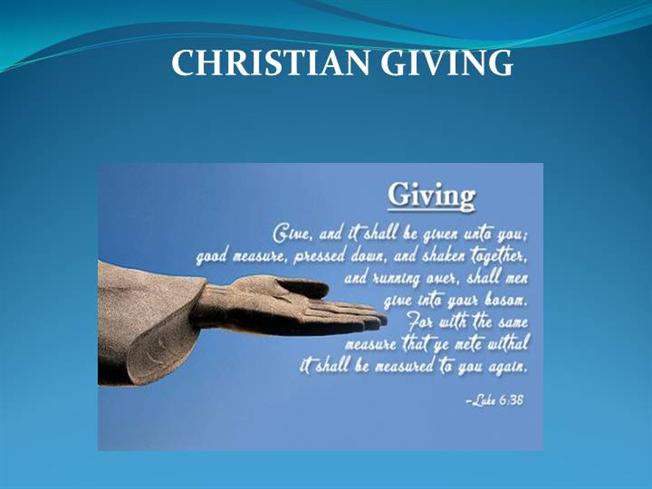
FORMS OF GIVING:
1. One way is to donate money to meet the needs of the underprivileged, the aged and the disabled.
2. Making financial contributions, like the purchase of poppies and so on.
3. Supporting the work of evangelism.
4. Rendering voluntary service to the Church, by helping to keep the premises clean
EVALUATION:
1. What is the meaning of inter-denominational Christian Churches?
2. Which year was CAN establish and when was it launched?
3. List two main objectives of CAN
4. The people of Philippi sent gifts through-------- to Paul.
5. Mention five Christian Organizations in Nigeria
ASSIGNMENT:
List five teaching that will foster greater unity among the various denominations in Nigeria.
TOPIC: Unity among Christians
CONTENT: a. Christian organizations in Nigeria
b. Definition of Inter-denomination and their activities
c. Christian giving
CHRISTIAN ORGANIZATIONS IN NIGERIA
All the churches in Nigeria have got organizations and societies. These organizations are set up especially for the spiritual and moral training of the youth so that they can grow up to be responsible and useful Christian citizens contributing their best to the peace, unity and progress of the Church and the nation. There are many organizations in Nigeria. Their aims are as follows:
1. To work together in preaching the gospel
2. To bring together people of the same aspirations for the growth of the church.
3. To have wider fellowship among Christians
4. To strengthen fellow Christians under persecution
5. To work together in finding solutions to Christians common problems.
The following are some Christian organizations in Nigeria:
1. Christian Association of Nigeria (CAN)
2. Nigeria Association of Biblical Studies (NABS)
3. National Association of Bible Knowledge Teachers of Nigeria (NABKTN)
4. Scripture Union of Nigeria (SUN)
5. Young Men Christian Association of Nigeria (YMCAN)
6. Young Women Christian Association of Nigeria (YWCAN)
7. Full Gospel Business Men Fellowship of Nigeria (FGBMFN)
8. Pentecostal Christian Fellowship of Nigeria (PCFN)
9. Nigeria Fellowship of Evangelical Students (NFEC)
10. Christian Lawyers Fellowship of Nigeria (CLFN)
11. Bible Society of Nigeria (BSN)

Definition of Inter-denomination and their activities.
A denomination is a group of Christians who separate themselves from other Christian groups in beliefs, practices and method of worship.
Inter-denomination means the coming together of different denominations for a common purpose. Some denominations are the Roman Catholic Church Denomination, the Anglican Church Denomination, the Baptist Church Denomination, the Methodist Church Denomination, and the Presbyterian Church Denomination.
A. INTER-DENOMINATIONAL ACTIVITIES AT THE LOCAL LEVEL:
Christian unity and co-operation at the local level is seen in young Christian organizations in towns and cities as well as institutions of learning. The activities are;
i. Members help each other to lead good Christian lives through Bible study and service to the community.
ii. They take part in community projects to provide social amenities like roads, bridges, schools, clinics, markets. Some of these organizations are: The Young Men Christian Association (YMCA) the Boys Brigade (B.B), the Girls Life Brigade (GLB), the Scripture Union (SU), and the fellowship of Christian Students (FCS).
iii. To raise the standard of living of the people. Some have worked hard together to build schools, teacher training colleges
iv. They give the rural community practical training in agriculture, health education and adult education.


B. INTER-DENOMINATIONAL ACTIVITIES AT THE NATIONAL LEVEL:
Christian unity and co-operation at the national level is connected with the activities of the Christian Association of Nigeria (CAN). It is made up of all the Christian denominations in Nigeria. It was established in 1976 and officially launched in 1980. It has five main objectives. These are to:
1. Serve as basis of response to the unity of the church
2. Act as a liaison committee for consultation and common action
3. Be a watch dog of the spiritual and moral welfare of the nation
4. Propagate the Gospel
5. Promote understanding among the various peoples and strata of society in Nigeria.
Through CAN, the Christian denominations unite and co-operate with one another on various local and national issues especially health, education, social welfare and politics.

C. CHRISTIAN UNITY AND CO-OPERATION AT THE INTERNATIONAL LEVEL:
Christian unity and co-operation at the international level is linked with the activities of international Christian Organizations such as the World Council of Churches, it was established in 1948, it has representatives at the headquarters of the World Council of Churches in Geneva, Switzerland. It aims at bringing about Christian co-operation and unity with fellow Protestants and with the Catholic Church. It helps in the social, religious, economic and political areas of national development. It also helped in the liberation struggle against apartheid in South Africa.
Another inter-denominational organization at the international level is the All African Conference of Churches. It was formed in Kampala in Uganda in 1963. It has branches in all African countries. It has links with the World Council of Churches.
The Catholic Church in Nigeria is linked with the Vatican, the government seat of all the Catholic Churches in the world. It has the Pope as its head.

LESSON 18
CHRISTIAN GIVING: PHIL 4:14-20; 2CORINT 8: 3-5; 6-15
Giving is an act of charity. It may take the form of donating money for a worthy cause. It may also take the form of sacrificing our time, effort or energy for a worthy cause. Paul taught about Christian giving in the letters to the Philippians and the Corinthians.
The Philippians remain good examples of people who gave to assist the work of God. They gave to Paul and he blessed them. Another recorded set of people that gave out of their free will were the Christians in Macedonia. As a result of their giving, God delivered them from affliction and extreme poverty.
When giving, two things are very important to consider, the quality of what we are giving and our state of mind. The Bible says that he who sows sparingly will also reap sparingly, and he who sows bountifully will also reap bountifully. Similarly, we are advised to give cheerfully.
Our giving can please or displease God. Cain’s offering displeased God. Abel’s offering pleased God. The widow in Matthew 12:41-44 pleased God with her penny. Dorcas attracted the power of resurrection through giving.

FORMS OF GIVING:
1. One way is to donate money to meet the needs of the underprivileged, the aged and the disabled.
2. Making financial contributions, like the purchase of poppies and so on.
3. Supporting the work of evangelism.
4. Rendering voluntary service to the Church, by helping to keep the premises clean
EVALUATION:
1. What is the meaning of inter-denominational Christian Churches?
2. Which year was CAN establish and when was it launched?
3. List two main objectives of CAN
4. The people of Philippi sent gifts through-------- to Paul.
5. Mention five Christian Organizations in Nigeria
ASSIGNMENT:
List five teaching that will foster greater unity among the various denominations in Nigeria.
WEEK 2
LESSON 19
TOPIC: UNITY AMONG CHRISTIANS
CONTENT: TEACHING THAT WILL FOSTER UNITY
Apart from the teaching of Christian giving which we have learnt in the last unit, the Bible contains other teachings that will foster greater unity among the various denominations in Nigeria.

1. FAITH AND WORKS (James 2: 14-26)
The Bible teaches us that faith without works is dead. For our faith to yield desired outcome, we need to make effort. A student who wants to be successful academically, for example, has to build his faith by depending on God the author of success and has to work towards it by reading his books seriously.
Similarly, a job seeker who stays indoors twenty-four hours of the day praying without going out to submit applications and look out for opportunities would end up disappointed. The Bible states categorically that faith without good works is barren, that is cannot bear fruits.
2. HUMILITY (Philippians 2:3-11, 1Pet 5: 5-11)
Humility is an attitude of not thinking that you are better than other people. It is the opposite of pride. The Bible says that God resists the proud and gives grace to the humble. Jesus Christ displayed humility when he came to this world and God highly exalted Him and bestowed on him the name which is above every name. Though he was in the form of God, He did not count equality with God. Instead, He humbled Himself, took the form and became obedient unto death on the cross.
3. IMPARTIALITY (James 2: 1-13)
Impartiality is an attitude of being just in dealing with people. We are impartial if do not take sides with any party when settling a dispute. A prefect who takes disciplinary measures on other students leaving his siblings or friends is partial. A church that pays attention to the haves alone, leaving the have-nots is partial and will definitely face God’s wrath if there is no repentance. God is the creator of the rich and the poor. So, let us learn to treat people equally. James addresses every Christian thus, “My brethren, show no partiality as you hold the faith of our Lord Jesus Christ, the Lord of glory”.
4. FORGIVENESS (Gal 6 :1-2)
Forgiveness is another important Christian virtue that all true Christians must possess. We must learn to forgive those who offend us in order for God to forgive us our own offences. We should always correct those doing wrong things in a spirit of gentleness, love and maturity.
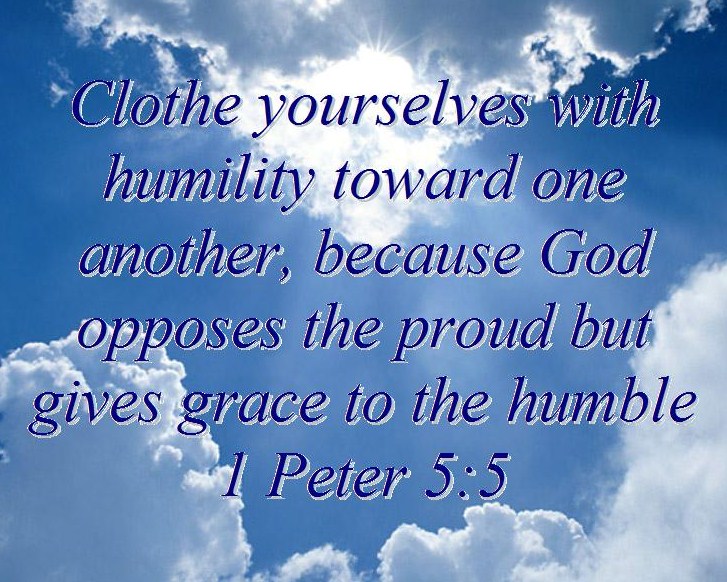
EVALUATION:
1. Define Humility
2. Give two reasons why a Christian should be humble
3. Give two reasons why Christians should not be partial
4. What is impartiality?
5. Why do we need to forgive our offenders?
ASSIGNMENT:
1. What is persecution?
2. List any five sources of persecution
TOPIC: UNITY AMONG CHRISTIANS
CONTENT: TEACHING THAT WILL FOSTER UNITY
Apart from the teaching of Christian giving which we have learnt in the last unit, the Bible contains other teachings that will foster greater unity among the various denominations in Nigeria.

1. FAITH AND WORKS (James 2: 14-26)
The Bible teaches us that faith without works is dead. For our faith to yield desired outcome, we need to make effort. A student who wants to be successful academically, for example, has to build his faith by depending on God the author of success and has to work towards it by reading his books seriously.
Similarly, a job seeker who stays indoors twenty-four hours of the day praying without going out to submit applications and look out for opportunities would end up disappointed. The Bible states categorically that faith without good works is barren, that is cannot bear fruits.
2. HUMILITY (Philippians 2:3-11, 1Pet 5: 5-11)
Humility is an attitude of not thinking that you are better than other people. It is the opposite of pride. The Bible says that God resists the proud and gives grace to the humble. Jesus Christ displayed humility when he came to this world and God highly exalted Him and bestowed on him the name which is above every name. Though he was in the form of God, He did not count equality with God. Instead, He humbled Himself, took the form and became obedient unto death on the cross.
3. IMPARTIALITY (James 2: 1-13)
Impartiality is an attitude of being just in dealing with people. We are impartial if do not take sides with any party when settling a dispute. A prefect who takes disciplinary measures on other students leaving his siblings or friends is partial. A church that pays attention to the haves alone, leaving the have-nots is partial and will definitely face God’s wrath if there is no repentance. God is the creator of the rich and the poor. So, let us learn to treat people equally. James addresses every Christian thus, “My brethren, show no partiality as you hold the faith of our Lord Jesus Christ, the Lord of glory”.
4. FORGIVENESS (Gal 6 :1-2)
Forgiveness is another important Christian virtue that all true Christians must possess. We must learn to forgive those who offend us in order for God to forgive us our own offences. We should always correct those doing wrong things in a spirit of gentleness, love and maturity.

EVALUATION:
1. Define Humility
2. Give two reasons why a Christian should be humble
3. Give two reasons why Christians should not be partial
4. What is impartiality?
5. Why do we need to forgive our offenders?
ASSIGNMENT:
1. What is persecution?
2. List any five sources of persecution
WEEK 3
LESSON 20
TOPIC: CHRISTIANS LIVING AMONG NON-CHRISTIANS
CONTENT: A. Christian Living in the community
B. Christian Attitude to Persecution
CHRISTIANS LIVING IN THE COMMUNITY: MATT 5: 13-16
Christians living in the community are the salt of the community. As salt prevents food from decay, so Christians are expected to prevent their community from moral decay. But if they fail to do this then they are of no use to the community morally. We are to preserve values like truthfulness, decent dressing, uprightness, respect for elders, hard work, etc
Christians living in the community are also referred to as the light of the world. The presence of light makes people see the right path in a dark environment. In a similar vein, our lives as Christians should show unbelievers in our community the way to Christ, the everlasting light. We are, therefore, advised thus, “Let your light so shine before men, that they may see your works and give glory to your Father who is in heaven”.
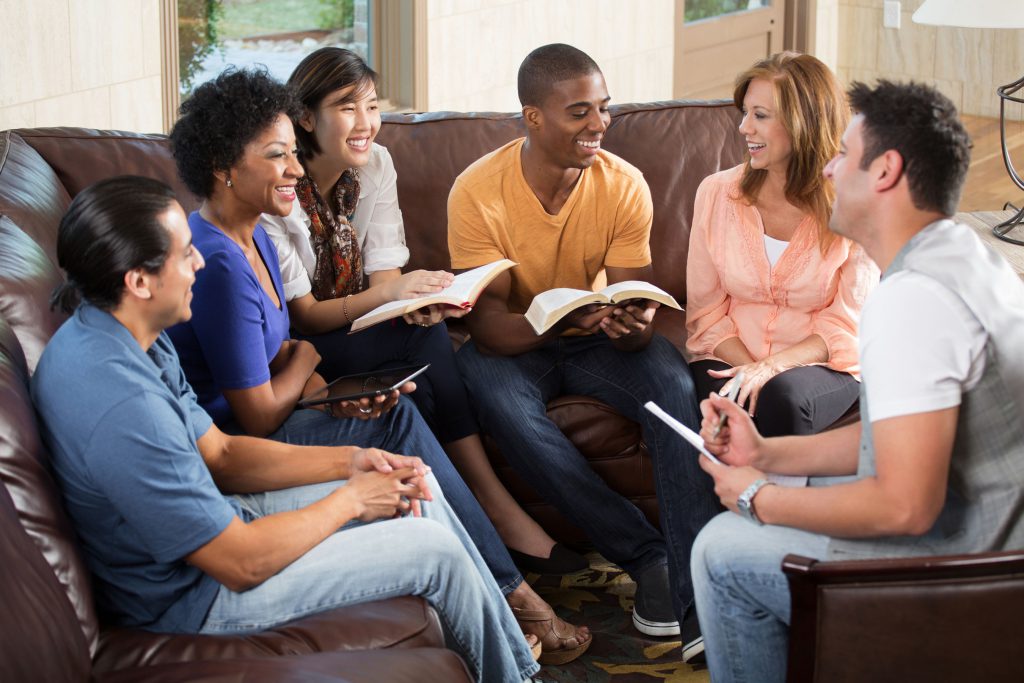
CHRISTIANS ATTITUDE TO PERSECUTION, JAMES 1:12-15;1PET 1:6-10;1PET3:13-17
Persecution refers to the harassment, trouble, embarrassment and affliction a Christian suffers because of his religious beliefs.
SOURCES OF PERSECUTION:
Persecution can come from different people and in different forms.
1. It can come from one’s parents and siblings: Family members who are not Christians may begin to make life uncomfortable for any member who gives his life to Christ.
2. Fellow students: Fellow students may persecute you by nick-naming you or raining abuses on you for not conniving to cheat in the examination hall.
3. Teachers or lecturers: Some teachers or lecturers may fail you for not giving them money or sleeping with them.
4. Fellow Christians
5. Community members and their leaders.
No matter the source of our persecution and the form it takes, Jesus says, “Blessed are those who are persecuted for righteousness’ sake, for theirs is the kingdom of heaven.” Christians should not retaliate but suffer it with happiness because the kingdom of God is for them.
James tells Christians that they should be happy and remain faithful under any trial. Any Christian who succeeds in passing such test will receives the reward which God promises those who love him.
Peter advised Christians to rejoice when they pass through various trials because it will show the genuineness of their faith and in the end, bring praise, glory and honour.

MORAL LESSONS:
1. We should always show good example anywhere we find ourselves because we are the salt of the earth and light of the world.
2. Trials and persecutions are for a while and when surmounted, the Christian receives accelerated promotion and blessing from God.
3. We should know the differences between persecution and punishment for offences we commit.
EVALUATION:
1. Write short note on each of the following:
a. A Christian as the salt of the earth
b. A Christian as the light of the world
2. What is Persecution?
3. List any five sources of Persecution.
ASSIGNMENT:
1. Explain peaceful co-existence
2. Give two examples of those who quarreled but later lived peacefully in the Bible
TOPIC: CHRISTIANS LIVING AMONG NON-CHRISTIANS
CONTENT: A. Christian Living in the community
B. Christian Attitude to Persecution
CHRISTIANS LIVING IN THE COMMUNITY: MATT 5: 13-16
Christians living in the community are the salt of the community. As salt prevents food from decay, so Christians are expected to prevent their community from moral decay. But if they fail to do this then they are of no use to the community morally. We are to preserve values like truthfulness, decent dressing, uprightness, respect for elders, hard work, etc
Christians living in the community are also referred to as the light of the world. The presence of light makes people see the right path in a dark environment. In a similar vein, our lives as Christians should show unbelievers in our community the way to Christ, the everlasting light. We are, therefore, advised thus, “Let your light so shine before men, that they may see your works and give glory to your Father who is in heaven”.

CHRISTIANS ATTITUDE TO PERSECUTION, JAMES 1:12-15;1PET 1:6-10;1PET3:13-17
Persecution refers to the harassment, trouble, embarrassment and affliction a Christian suffers because of his religious beliefs.
SOURCES OF PERSECUTION:
Persecution can come from different people and in different forms.
1. It can come from one’s parents and siblings: Family members who are not Christians may begin to make life uncomfortable for any member who gives his life to Christ.
2. Fellow students: Fellow students may persecute you by nick-naming you or raining abuses on you for not conniving to cheat in the examination hall.
3. Teachers or lecturers: Some teachers or lecturers may fail you for not giving them money or sleeping with them.
4. Fellow Christians
5. Community members and their leaders.
No matter the source of our persecution and the form it takes, Jesus says, “Blessed are those who are persecuted for righteousness’ sake, for theirs is the kingdom of heaven.” Christians should not retaliate but suffer it with happiness because the kingdom of God is for them.
James tells Christians that they should be happy and remain faithful under any trial. Any Christian who succeeds in passing such test will receives the reward which God promises those who love him.
Peter advised Christians to rejoice when they pass through various trials because it will show the genuineness of their faith and in the end, bring praise, glory and honour.

MORAL LESSONS:
1. We should always show good example anywhere we find ourselves because we are the salt of the earth and light of the world.
2. Trials and persecutions are for a while and when surmounted, the Christian receives accelerated promotion and blessing from God.
3. We should know the differences between persecution and punishment for offences we commit.
EVALUATION:
1. Write short note on each of the following:
a. A Christian as the salt of the earth
b. A Christian as the light of the world
2. What is Persecution?
3. List any five sources of Persecution.
ASSIGNMENT:
1. Explain peaceful co-existence
2. Give two examples of those who quarreled but later lived peacefully in the Bible
WEEK 4
LESSON 21
TOPIC: PEACEFUL CO-EXISTENCE
CONTENT:
1. EXPLANATION OF PEACEFUL CO-EXISTENCE
- INSTANCES IN THE BIBLE OF PEOPLE DESIRING PEACEFUL CO-EXISTENCE
-RECALL HOW PEOPLE CAN SHOW DESIRE FOR PEACEFUL CO-EXISTENCE
2. ORIGIN OF CHRISTIANITY AND ISLAM FROM ABRAHAM AS ONE FATHER
EXPLANATION OF PEACEFUL CO-EXISTENCE:
Peaceful co-existence means living together peacefully in one house, compound, village, town, state or one country. Without peaceful co-existence there cannot be a home, a compound, a village, a town, a state or a country.
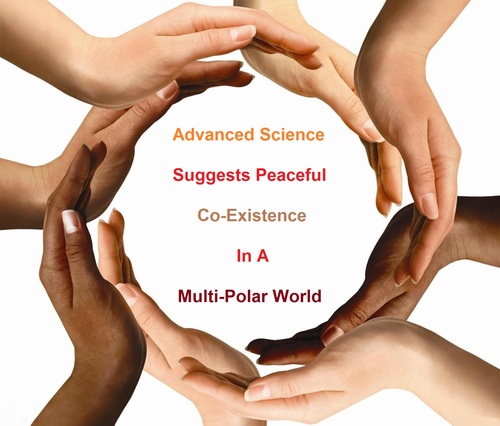
INSTANCES IN THE BIBLE OF PEOPLE DESIRING PEACEFUL CO-EXISTENCE:
The story of Abraham and Lot (Genesis 3: 1-8, 26: 25-29): When God called Abraham to leave his country for the Promised Land, he went with his wife and his nephew, Lot with his wife, and their servants, and with their property they could carry. When they reached the land of Canaan, they settled for sometimes in a town called Shechem. Both of them became rich. They had plenty of cattle and workers to look after them. After several years of grazing on the grass in Shechem, the grass was no longer enough for the cattle of Abraham and Lot. Their workers were always quarrelling among themselves over the little grass that was available. This did not bring about peaceful co-existence between Abraham and Lot, and Abraham was not happy about it.
For the purpose of peaceful co-existence, Abraham and Lot separated, one going to the east of the land and the other to the west of it.
https://youtu.be/bl5xljEf0PI
The story of Isaac and Abimelech (Genesis 26: 2-29): After the death of Abraham, Isaac and his family went and lived in the land of the Philistines. The Philistine king was called Abimelech. The king gave Isaac and his family a place called Gerar to stay. God blessed Isaac and he became a rich farmer. Isaac lived peacefully with the Philistines.
The attitude of the Philistines changed towards Isaac when they saw that he was becoming richer and richer. They envied him and became envious of his increasing wealth. The Philistines tried to annoy Isaac so that he would fight them. They put sand into all the wells of Isaac so that his animals would die for lack of water to drink. Later, the Philistines were ashamed of what they had been doing to Isaac because he did not get angry of fight back. The king and his people came to Isaac and asked him to forgive them for the bad things they had done to him. Isaac forgave them and there was peaceful co-existence between them again.
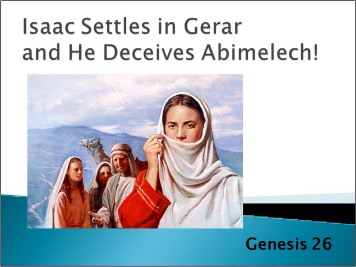
The story of Esau and Jacob (Genesis 35: 4-47): Esau and Jacob were the twin sons of Isaac and Rebecca. Esau was the elder of the two. Jacob who was very greedy cheated his elder brother, Esau on two occasions. On the first occasion Jacob greedily takes Esau’s birthright for a mess of pottage. The second occasion was when Isaac was about to die. He told Esau to prepare a good meal for him to eat so that he would bless him before he died. But Rebecca over heard Isaac’s request she told Jacob to hurry and prepare a good meal for his father to receive the blessings meant for Esau. Jacob cheated his brother again and ran away to their uncle Laban who lived in Haran, later Esau and Jacob reconciled because of their desire for peaceful co-existence.
https://youtu.be/TT18k7Tq8XE
The story of Philemon and Onesimus (Philemon): Philemon had a slave called Onesimus . There was peace between Philemon Onesimus until the slave stole from his master and ran away to Rome. In Rome, he met Paul who converted him and he became a Christian. He became a good person. Onesimus became sorry for having stolen from his master (Philemon). He confessed his sin to Paul and asked for forgiveness. Paul therefore wrote Philemon a letter to bring the two of them back together so that there would be peaceful co-existence between them again. When Philemon got the letter he was very happy, and lived peacefully with his slave (Onesimus) once again.
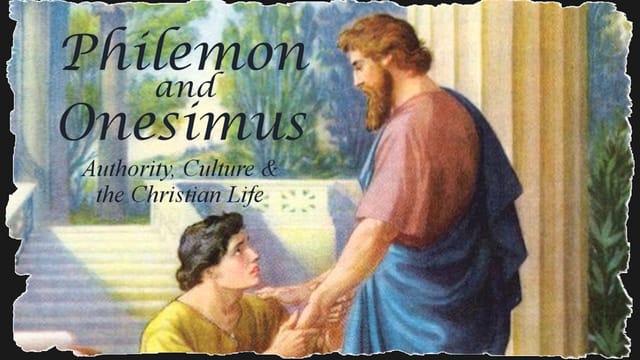
LESSON 22
RECALL HOW PEOPLE CAN SHOW A DESIRE FOR PEACEFUL CO-EXISTENCE
1. By Dialogue: When there is a quarrel or a misunderstanding between two persons, the two persons should come together and discuss in the spirit of love and sincerity.
2. By Tolerance: Tolerance is an act of compromise, willingness of both parties in a quarrel to give in to each other, willingness to forgo one’s rights or pride for the sake of peaceful co-existence.
3. By Forgiveness: If we forgive those who offend us and those we offend forgive us, there will be no prolonged quarrelling between the offenders and the offended.
4. Reconciliation: Reconciliation is when friends who have quarreled become friends again.
THE ORIGIN OF CHRISTIANITY AND ISLAM.
Christianity and Islam trace their origin to Abraham. Abraham was the father of Isaac and Isaac was the father of Israel and Jesus who founded Christianity was his descendant.
Abraham was also the father of Ishmael and Mohammed who founded Islam was a descendant of Ishmael. An Arab family in Mecca in Saudi Arabia, Abdullah and Amina gave birth to a baby boy. He was called Muhammad, when he was twenty five he married a wealthy Arabian woman called Khadijah. God sent angel Gabriel to him and commanded him to recite the word of God. In the name of the Lord who created everything. Angel Gabriel continued to visit Mohammed in the cave and gave him more messages to recite. The messages were collected to form the Holy Quran, the Holy book in Islam.
Thus the two religions came from one ancestor, Abraham and from one country Mesopotamia. From Mesopotamia the Israelites came to settle in Israel and the Ishmaelites in Arabia. In the light of this, Christians and Muslims should live together in peace.
MORAL LESSONS:
1. Everybody wants peace; therefore all of us should be ready to pay the price of peaceful co-existence.
2. From the relationship of Abraham and Lot we learn that peaceful co-existence may bring inconvenience.
3. The story of Isaac and Abimelech teaches that peaceful co-existence demands the spirit of give and take.
EVALUATION:
1. What is peaceful co-existence?
2. How Christians and Muslims ought to live in the light of the origin of their religions?
3. Why is Abraham a man of peace?
4. Who is the ancestor of Christians and Muslims?
5. State five ways on how people can show a desire for peaceful co-existence
TOPIC: PEACEFUL CO-EXISTENCE
CONTENT:
1. EXPLANATION OF PEACEFUL CO-EXISTENCE
- INSTANCES IN THE BIBLE OF PEOPLE DESIRING PEACEFUL CO-EXISTENCE
-RECALL HOW PEOPLE CAN SHOW DESIRE FOR PEACEFUL CO-EXISTENCE
2. ORIGIN OF CHRISTIANITY AND ISLAM FROM ABRAHAM AS ONE FATHER
EXPLANATION OF PEACEFUL CO-EXISTENCE:
Peaceful co-existence means living together peacefully in one house, compound, village, town, state or one country. Without peaceful co-existence there cannot be a home, a compound, a village, a town, a state or a country.

INSTANCES IN THE BIBLE OF PEOPLE DESIRING PEACEFUL CO-EXISTENCE:
The story of Abraham and Lot (Genesis 3: 1-8, 26: 25-29): When God called Abraham to leave his country for the Promised Land, he went with his wife and his nephew, Lot with his wife, and their servants, and with their property they could carry. When they reached the land of Canaan, they settled for sometimes in a town called Shechem. Both of them became rich. They had plenty of cattle and workers to look after them. After several years of grazing on the grass in Shechem, the grass was no longer enough for the cattle of Abraham and Lot. Their workers were always quarrelling among themselves over the little grass that was available. This did not bring about peaceful co-existence between Abraham and Lot, and Abraham was not happy about it.
For the purpose of peaceful co-existence, Abraham and Lot separated, one going to the east of the land and the other to the west of it.
https://youtu.be/bl5xljEf0PI
The story of Isaac and Abimelech (Genesis 26: 2-29): After the death of Abraham, Isaac and his family went and lived in the land of the Philistines. The Philistine king was called Abimelech. The king gave Isaac and his family a place called Gerar to stay. God blessed Isaac and he became a rich farmer. Isaac lived peacefully with the Philistines.
The attitude of the Philistines changed towards Isaac when they saw that he was becoming richer and richer. They envied him and became envious of his increasing wealth. The Philistines tried to annoy Isaac so that he would fight them. They put sand into all the wells of Isaac so that his animals would die for lack of water to drink. Later, the Philistines were ashamed of what they had been doing to Isaac because he did not get angry of fight back. The king and his people came to Isaac and asked him to forgive them for the bad things they had done to him. Isaac forgave them and there was peaceful co-existence between them again.

The story of Esau and Jacob (Genesis 35: 4-47): Esau and Jacob were the twin sons of Isaac and Rebecca. Esau was the elder of the two. Jacob who was very greedy cheated his elder brother, Esau on two occasions. On the first occasion Jacob greedily takes Esau’s birthright for a mess of pottage. The second occasion was when Isaac was about to die. He told Esau to prepare a good meal for him to eat so that he would bless him before he died. But Rebecca over heard Isaac’s request she told Jacob to hurry and prepare a good meal for his father to receive the blessings meant for Esau. Jacob cheated his brother again and ran away to their uncle Laban who lived in Haran, later Esau and Jacob reconciled because of their desire for peaceful co-existence.
https://youtu.be/TT18k7Tq8XE
The story of Philemon and Onesimus (Philemon): Philemon had a slave called Onesimus . There was peace between Philemon Onesimus until the slave stole from his master and ran away to Rome. In Rome, he met Paul who converted him and he became a Christian. He became a good person. Onesimus became sorry for having stolen from his master (Philemon). He confessed his sin to Paul and asked for forgiveness. Paul therefore wrote Philemon a letter to bring the two of them back together so that there would be peaceful co-existence between them again. When Philemon got the letter he was very happy, and lived peacefully with his slave (Onesimus) once again.

LESSON 22
RECALL HOW PEOPLE CAN SHOW A DESIRE FOR PEACEFUL CO-EXISTENCE
1. By Dialogue: When there is a quarrel or a misunderstanding between two persons, the two persons should come together and discuss in the spirit of love and sincerity.
2. By Tolerance: Tolerance is an act of compromise, willingness of both parties in a quarrel to give in to each other, willingness to forgo one’s rights or pride for the sake of peaceful co-existence.
3. By Forgiveness: If we forgive those who offend us and those we offend forgive us, there will be no prolonged quarrelling between the offenders and the offended.
4. Reconciliation: Reconciliation is when friends who have quarreled become friends again.
THE ORIGIN OF CHRISTIANITY AND ISLAM.
Christianity and Islam trace their origin to Abraham. Abraham was the father of Isaac and Isaac was the father of Israel and Jesus who founded Christianity was his descendant.
Abraham was also the father of Ishmael and Mohammed who founded Islam was a descendant of Ishmael. An Arab family in Mecca in Saudi Arabia, Abdullah and Amina gave birth to a baby boy. He was called Muhammad, when he was twenty five he married a wealthy Arabian woman called Khadijah. God sent angel Gabriel to him and commanded him to recite the word of God. In the name of the Lord who created everything. Angel Gabriel continued to visit Mohammed in the cave and gave him more messages to recite. The messages were collected to form the Holy Quran, the Holy book in Islam.
Thus the two religions came from one ancestor, Abraham and from one country Mesopotamia. From Mesopotamia the Israelites came to settle in Israel and the Ishmaelites in Arabia. In the light of this, Christians and Muslims should live together in peace.
MORAL LESSONS:
1. Everybody wants peace; therefore all of us should be ready to pay the price of peaceful co-existence.
2. From the relationship of Abraham and Lot we learn that peaceful co-existence may bring inconvenience.
3. The story of Isaac and Abimelech teaches that peaceful co-existence demands the spirit of give and take.
EVALUATION:
1. What is peaceful co-existence?
2. How Christians and Muslims ought to live in the light of the origin of their religions?
3. Why is Abraham a man of peace?
4. Who is the ancestor of Christians and Muslims?
5. State five ways on how people can show a desire for peaceful co-existence
REVISION
REVISION QUESTIONS:
JSS 3 OBJECTIVE TEST QUESTIONS
1. After the resurrection of Jesus, He commanded his disciples to establish Christianity throughout the whole world (a) Damascus (b) Samaria (c) Judah (d) Jerusalem.
2. To explain the outpouring of the Holy Spirit on the day of Pentecost, Peter quoted prophet
(a) Daniel (b) Abraham (c) Joel (d) Isaiah.
3. One of the charges against Stephen was (a) Adultery (b) Envy (c) Jealousy (d) Blasphemy
4. At Whose Feet Did the Murderers of Stephen place their dresses? (a) Felix (b) Gamaliel (c) Saul (d) Agrippa.
5. Those who have come to Jerusalem to celebrate the feast of the Pentecost heard each of the apostle ( a) Preaching in the name of Jesus (b) preaching in their own language (c) Proclaiming that Jesus was the Christ (d) Telling them About the Holy Spirit.
6. “Lord do not hold this sin against them” Who made this Statement? (a) Jesus (b) Stephen (c) Peter (d) Paul.
7. Who was the first Christian martyr? (a) Jesus (b) John (c) James (d) Stephen.
8. Peter and John Healed the crippled man who was always sited at the --------- gate (a) beautiful (b) Kings (c) Market (d) palace.
9. The other apostles were initially against Peter going to Cornelius house because he was ----------
(a) A Gentile (b) Soldier (c) Against the church (d) hated by the apostles.
10. ------------- was the name of the magician at Paphos who opposed Paul’s missionary activity
(a) Bar –Jesus (b) Sergius Paulus (c) Joel (d) Saul.
11. Paul and Barnabas were set apart for missionary work in ------- (a) Antioch in Syria (b) Jerusalem (c) Damascus (d) Antioch in Pisidia
12. Saul was converted on his way to (a) Jerusalem (b) Tarsus (c) Cilicia (d) Damascus.
13. Paul And Barnabas were called --------- and -------- at Lystra (a) Hermes Isis (b) Hermes and Zeus (c) Diana and Artemis (d) James and John.
14. The ‘Hermes god in Greek means------ (a) Mercury (b) Venus (c) Jupiter (d) Uranus.
15. ------- and ------- lied to the Holy Spirit (a) James and John (b) Peter and Ananias
(c) Ananias and Deborah (d) Ananias and Sapphira.
16. The Grecian-Jews murmured against the (a) Hellenites (b) Hebrews (c) Romans (d) Israelites.
17. Before Peter’s speech, the number of Believers was ------ and after his speech, the number rose to about ----- (a) 150 and 3,000 (b) 120 and 3000 (c) 200 and 5000 (d) 130 and 4000.
18. Why did Herod Agrippa killed James? (a) To please the Jews and make them like him (b) To acquire more wealth (c) To please the Romans (d) To spread Christianity.
19. When the church in Jerusalem heard of the success of Philip in Samaria, they sent ------ and ------ so that they might encourage the people of Samaria in the Christian life. (a) Paul and Barnabas (b) Peter and James (c) Peter and Paul (d) Peter and John.
20. The name of Paul’s teacher was? (a) Barnabas (b) Simeon (c) Gamaliel (d) Zechariah.
21 Who was the first Gentile to be converted to Christianity? (a) Silas (b) Paul (c) Timon (d) Cornelius.
22. The life of the early church was characterized by (a) Spirit of oneness and disparity (b) Fellowship of different kinds (c) Commitment to various denominations (d) Strong fellowship and spirit of sharing.
23. The Jews in Damascus planned to kill Paul because he ( a) broke their laws (b) earlier persecuted believers (c) had too many converts (d) refused to obey the high Priest
24. Paul was taken on trial before Felix in respect to the (a) Conversion of Herod (b) Conversion of the Jailers (c) Insurrection (d) Resurrection of the death.
25. The inscription to the ” unknown god “ was seen at -----(a) Rome (b) Athens (c) Nigeria (d) Jerusalem.
26. What did Paul do to the magician (Elymas or Bar-Jesus) who tried to hinder the governor (Sergius Paulus) from hearing the Gospel? (a) Slapped him (b) Rebuked him and he became blind (c) avoided him (d) Called for his arrest.
27. Tabitha or Dorcas was known in Joppa for her (a) Complaints (b) fighting (c) giving (d) preaching.
28. During the conversion, Saul was asked to go to a street known as --------- and to meet a man called -------- to receive his sight. (a) Broad and Ananias (b) Straight and Ananias (c) London and Barnabas (d) Ajegunle and Thomas.
29. The sin that killed Ananias and Sapphira was (a) Adultery (b) Disobedience (c) stealing (d) Lying.
30. -------- succeeded Felix as governor of Caesarea. (a) Agrippa (b) Claudius (c) Drisular (d) Porcius Festus.
31. Paul and Silas were imprisoned when Paul healed a slave girl with the spirit of divination in the town of ----- (a) Derbe (b) Lystra (c) Galatia (d) Philippi.
32. In which of the following cities was an attempt to sacrifice Paul and Barnabas? (a) Derbe (b) Athens (c) Lystra (d) Paphos.
33. Two of the seven deacons chosen to serve tables in the early church were (a) Parmenas and Timon (b) Matthias and Cornelius (c) Nathaniel and Philip (d) Stephen and Andrew.
34. “Go, for he is a chosen instrument of mine to carry my name before the gentiles and kings and sons of Israel”. The above statement was made with respect to (a) Ananias (b) Philip (c) Barnabas (d) Saul.
35. Why did the Hellenites in the early church murmur against the Hebrews? (a) They were not accounted leadership role in the early church (b) Their widows were neglected in the daily distribution (c) The Hebrews treated them as foreigners (d) They were not taught the Hebrew language.
36. Who among the following introduced Paul to the disciples in Jerusalem after his conversion? (a) Ananias (b) Philip (c) Barnabas (d) James.
37. Which of the following is the significance of Peter’s vision at Joppa? (a) God provided for all our needs (b) Man must seek to know the will of God. (c) All animals are edible (d) All men are equal before God.
38. After fasting and praying, the church in Antioch laid hands on Saul and Barnabas and sent them off. The laying of hands signifies (a) Blessing (b) imparting of the Holy Spirit (c) Confirmation (d) commissioning.
39. “To abstain from what has been sacrificed to idols and from blood and fro what is strangled and from unchastity…….” To which issue was the above seen as response? (a) Immoral behavior (b) circumcision controversy (c) Idol worship (d) Demon possession.
40. The Jerusalem council was held to (a) allow the gentiles hear the gospel (b) appoint leaders for the gentile churches as condition for gentiles churches. (c) Resolve the problem of circumcision as condition for gentiles salvation (d) Settle the dispute that arose between Paul and Barnabas during the first missionary journey.
41. Moses Orimolade and Christian Abiodun founded the -------- church. (a) Aladura (b) Celestial (c) Christ Apostolic Church (d) Cherubim and Seraphim.
42. The head of the Catholic Church in the whole world is called (a) Archbishop (b) Bishop (c) Holy Emperor (d) Pope.
43. Mother Theresa was from --------- in Eastern Europe (a) Albania (b) Hungary (c) Yugoslavia (d) Siberia.
44. The real name of mother Theresa is (a) Agnes Gonxha Bojaxhin (b) Florence Nightingale (c) Mary Gonxa (d) Mary Lorentto.
45. The seat of government of all the Catholic Churches in the world is called (a) Poland (b) Vatican (c) Holy See (d) Jerusalem the city of David.
46. Who was raised from the dead by Moses Orimolade? (a) Christian Abiodun (b) Christy Adedokun (c) Elizabeth Omikunle (d) Toyin Abiodun.
47. Who advised the Sanhedrin to keep away from the apostles and let them alone? (a) James (b) Gamaliel (c) Paul (d) Caiaphas.
48. One of the biggest problems facing the Churches in Nigeria is (a) attendance (b) construction (c) disunity (d) Leadership.
49. On the road to Gaza, Philip converted and baptized a (a) Minister of Candice (b) Roman officer (c) Centurion (d) Samaritan.
50. And the angel said to him, “dress yourself and put on your sandals”. The person being referred to here was (a) John (b) Paul (c) James (d) Peter.
JSS 3 OBJECTIVE TEST QUESTIONS
1. After the resurrection of Jesus, He commanded his disciples to establish Christianity throughout the whole world (a) Damascus (b) Samaria (c) Judah (d) Jerusalem.
2. To explain the outpouring of the Holy Spirit on the day of Pentecost, Peter quoted prophet
(a) Daniel (b) Abraham (c) Joel (d) Isaiah.
3. One of the charges against Stephen was (a) Adultery (b) Envy (c) Jealousy (d) Blasphemy
4. At Whose Feet Did the Murderers of Stephen place their dresses? (a) Felix (b) Gamaliel (c) Saul (d) Agrippa.
5. Those who have come to Jerusalem to celebrate the feast of the Pentecost heard each of the apostle ( a) Preaching in the name of Jesus (b) preaching in their own language (c) Proclaiming that Jesus was the Christ (d) Telling them About the Holy Spirit.
6. “Lord do not hold this sin against them” Who made this Statement? (a) Jesus (b) Stephen (c) Peter (d) Paul.
7. Who was the first Christian martyr? (a) Jesus (b) John (c) James (d) Stephen.
8. Peter and John Healed the crippled man who was always sited at the --------- gate (a) beautiful (b) Kings (c) Market (d) palace.
9. The other apostles were initially against Peter going to Cornelius house because he was ----------
(a) A Gentile (b) Soldier (c) Against the church (d) hated by the apostles.
10. ------------- was the name of the magician at Paphos who opposed Paul’s missionary activity
(a) Bar –Jesus (b) Sergius Paulus (c) Joel (d) Saul.
11. Paul and Barnabas were set apart for missionary work in ------- (a) Antioch in Syria (b) Jerusalem (c) Damascus (d) Antioch in Pisidia
12. Saul was converted on his way to (a) Jerusalem (b) Tarsus (c) Cilicia (d) Damascus.
13. Paul And Barnabas were called --------- and -------- at Lystra (a) Hermes Isis (b) Hermes and Zeus (c) Diana and Artemis (d) James and John.
14. The ‘Hermes god in Greek means------ (a) Mercury (b) Venus (c) Jupiter (d) Uranus.
15. ------- and ------- lied to the Holy Spirit (a) James and John (b) Peter and Ananias
(c) Ananias and Deborah (d) Ananias and Sapphira.
16. The Grecian-Jews murmured against the (a) Hellenites (b) Hebrews (c) Romans (d) Israelites.
17. Before Peter’s speech, the number of Believers was ------ and after his speech, the number rose to about ----- (a) 150 and 3,000 (b) 120 and 3000 (c) 200 and 5000 (d) 130 and 4000.
18. Why did Herod Agrippa killed James? (a) To please the Jews and make them like him (b) To acquire more wealth (c) To please the Romans (d) To spread Christianity.
19. When the church in Jerusalem heard of the success of Philip in Samaria, they sent ------ and ------ so that they might encourage the people of Samaria in the Christian life. (a) Paul and Barnabas (b) Peter and James (c) Peter and Paul (d) Peter and John.
20. The name of Paul’s teacher was? (a) Barnabas (b) Simeon (c) Gamaliel (d) Zechariah.
21 Who was the first Gentile to be converted to Christianity? (a) Silas (b) Paul (c) Timon (d) Cornelius.
22. The life of the early church was characterized by (a) Spirit of oneness and disparity (b) Fellowship of different kinds (c) Commitment to various denominations (d) Strong fellowship and spirit of sharing.
23. The Jews in Damascus planned to kill Paul because he ( a) broke their laws (b) earlier persecuted believers (c) had too many converts (d) refused to obey the high Priest
24. Paul was taken on trial before Felix in respect to the (a) Conversion of Herod (b) Conversion of the Jailers (c) Insurrection (d) Resurrection of the death.
25. The inscription to the ” unknown god “ was seen at -----(a) Rome (b) Athens (c) Nigeria (d) Jerusalem.
26. What did Paul do to the magician (Elymas or Bar-Jesus) who tried to hinder the governor (Sergius Paulus) from hearing the Gospel? (a) Slapped him (b) Rebuked him and he became blind (c) avoided him (d) Called for his arrest.
27. Tabitha or Dorcas was known in Joppa for her (a) Complaints (b) fighting (c) giving (d) preaching.
28. During the conversion, Saul was asked to go to a street known as --------- and to meet a man called -------- to receive his sight. (a) Broad and Ananias (b) Straight and Ananias (c) London and Barnabas (d) Ajegunle and Thomas.
29. The sin that killed Ananias and Sapphira was (a) Adultery (b) Disobedience (c) stealing (d) Lying.
30. -------- succeeded Felix as governor of Caesarea. (a) Agrippa (b) Claudius (c) Drisular (d) Porcius Festus.
31. Paul and Silas were imprisoned when Paul healed a slave girl with the spirit of divination in the town of ----- (a) Derbe (b) Lystra (c) Galatia (d) Philippi.
32. In which of the following cities was an attempt to sacrifice Paul and Barnabas? (a) Derbe (b) Athens (c) Lystra (d) Paphos.
33. Two of the seven deacons chosen to serve tables in the early church were (a) Parmenas and Timon (b) Matthias and Cornelius (c) Nathaniel and Philip (d) Stephen and Andrew.
34. “Go, for he is a chosen instrument of mine to carry my name before the gentiles and kings and sons of Israel”. The above statement was made with respect to (a) Ananias (b) Philip (c) Barnabas (d) Saul.
35. Why did the Hellenites in the early church murmur against the Hebrews? (a) They were not accounted leadership role in the early church (b) Their widows were neglected in the daily distribution (c) The Hebrews treated them as foreigners (d) They were not taught the Hebrew language.
36. Who among the following introduced Paul to the disciples in Jerusalem after his conversion? (a) Ananias (b) Philip (c) Barnabas (d) James.
37. Which of the following is the significance of Peter’s vision at Joppa? (a) God provided for all our needs (b) Man must seek to know the will of God. (c) All animals are edible (d) All men are equal before God.
38. After fasting and praying, the church in Antioch laid hands on Saul and Barnabas and sent them off. The laying of hands signifies (a) Blessing (b) imparting of the Holy Spirit (c) Confirmation (d) commissioning.
39. “To abstain from what has been sacrificed to idols and from blood and fro what is strangled and from unchastity…….” To which issue was the above seen as response? (a) Immoral behavior (b) circumcision controversy (c) Idol worship (d) Demon possession.
40. The Jerusalem council was held to (a) allow the gentiles hear the gospel (b) appoint leaders for the gentile churches as condition for gentiles churches. (c) Resolve the problem of circumcision as condition for gentiles salvation (d) Settle the dispute that arose between Paul and Barnabas during the first missionary journey.
41. Moses Orimolade and Christian Abiodun founded the -------- church. (a) Aladura (b) Celestial (c) Christ Apostolic Church (d) Cherubim and Seraphim.
42. The head of the Catholic Church in the whole world is called (a) Archbishop (b) Bishop (c) Holy Emperor (d) Pope.
43. Mother Theresa was from --------- in Eastern Europe (a) Albania (b) Hungary (c) Yugoslavia (d) Siberia.
44. The real name of mother Theresa is (a) Agnes Gonxha Bojaxhin (b) Florence Nightingale (c) Mary Gonxa (d) Mary Lorentto.
45. The seat of government of all the Catholic Churches in the world is called (a) Poland (b) Vatican (c) Holy See (d) Jerusalem the city of David.
46. Who was raised from the dead by Moses Orimolade? (a) Christian Abiodun (b) Christy Adedokun (c) Elizabeth Omikunle (d) Toyin Abiodun.
47. Who advised the Sanhedrin to keep away from the apostles and let them alone? (a) James (b) Gamaliel (c) Paul (d) Caiaphas.
48. One of the biggest problems facing the Churches in Nigeria is (a) attendance (b) construction (c) disunity (d) Leadership.
49. On the road to Gaza, Philip converted and baptized a (a) Minister of Candice (b) Roman officer (c) Centurion (d) Samaritan.
50. And the angel said to him, “dress yourself and put on your sandals”. The person being referred to here was (a) John (b) Paul (c) James (d) Peter.